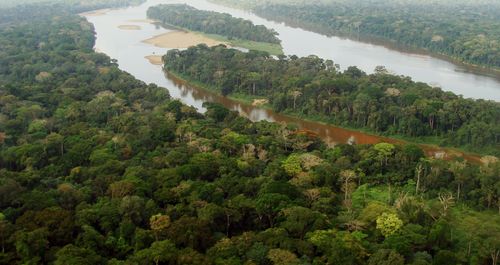Preserving and protecting the natural forests is crucial for long-term sustainability. Sustainable harvesting has a positive impact on tropical forests in the long run, producing a renewable and sustainable product, wood, with a carbon positive impact. Tropical wood made from sustainable forest operations is the better and most sustainable choice of product in comparison to other building materials such as steel, plastic or concrete.

Forset Group sustainably manages 1.2 million hectares of FSC- certified tropical natural forest with over 250 tree species in the Republic of Congo (Ngombé). On average, we harvest one tree per two hectares, equal to more than two soccer fields, once every 30 years by using reduced impact harvesting in an area of 800.000 hectares. Our extended circulation cycle ensures continued natural regrowth of the forest. The remaining 400.000 hectares are designated for permanent conservation and protection. These areas are fragile and socially important for the 3.793 indigenous people and their way of life.
“Sustainable forest management operations produce sustainable materials, fight climate change, protect biodiversity, improve living and working conditions, and support the local economy.”
Through reduced impact harvesting, we ensure natural regeneration by carefully selecting each tree we harvest using our advanced GPS-based tree tracking system. Forset Group has developed a very comprehensive predetermined 30-year rotation system. This management method does not harm nor have a negative impact on the surrounding environment, forest growth, or biodiversity. We ensure no harm and maximum forest protection through the usage of artificial intelligence.

Sawdust and off-cuts are often underutilized or not utilized at all. In most cases, it is considered a waste product to be discarded. Forset Group introduces new technology for efficient utilization of waste products from sustainable forest operations. This is also a long-term solution for permanent carbon sequestration.
We consider waste products to be an important asset. With wood off-cuts and residuals, we create additional carbon credits, CO2-negative energy, fertilizer for our reforestation projects, and permanent carbon sinks using proven and unique technology. This early-stage technology is already implemented in current forest operations, and we continue to invest in improving and scaling this technology.
The carbon initially captured by trees gets transformed into biochar during a pyrolysis process. In this process, heat without oxygen is applied to break down molecular chains and rearrange molecular bonds to form a firm product. The outcome is biochar and electricity. The biochar can be stored in the soil while also functioning as a soil fertilizer. Alternatively, the biochar can be stored in permanent carbon sinks underground or added to road construction material for thousands of years.

Forest recovery depends mainly on the type of reforestation methods and the amount of effort being implemented. A common strategy used by many companies for planting trees is growing one or a few fast-growing species, also called monoculture. 45% of all commitments to restoration plans made under the Bonn Challenge involve planting monocultures of trees as profitable enterprises. This is, in our view, not a long-term sustainable solution. Monoculture does not nurture biodiversity, restore important ecosystems, or improve carbon storage. When plantations are harvested, the carbon is released into the atmosphere again.
Forset Group is currently in the process of launching a new reforestation program of 20,000 hectares using only natural species mix. This is because most species in the tropical rainforest are greatly dependent on each other for survival. It is the tropical rainforest’s wonderfully rich ecosystems that support life on Earth.
“Reforestation initiatives restore degraded land, regenerate biodiversity, sequester CO2 and improve livelihoods for the local populations.”


Forset Group’s carbon credits are of the highest quality. Our projects are not only initiated for the purpose of carbon sequestration. All activities provide local development benefits beyond the climate, forest preservation, and biodiversity. These benefits include creating a foundation for sustainable economic growth and thereby improving livelihood for the local population. We aim for all our activities to have significant, positive social and economic impacts on the local community and to engage local stakeholders.
Forset Group are pioneers in developing carbon credits. We have developed Verra-certified carbon credits based on methodologies developed together with The Nature Conservancy starting in 2015. We continue to expand upon our innovative solutions to increase the amount of high-quality carbon credits issued.
